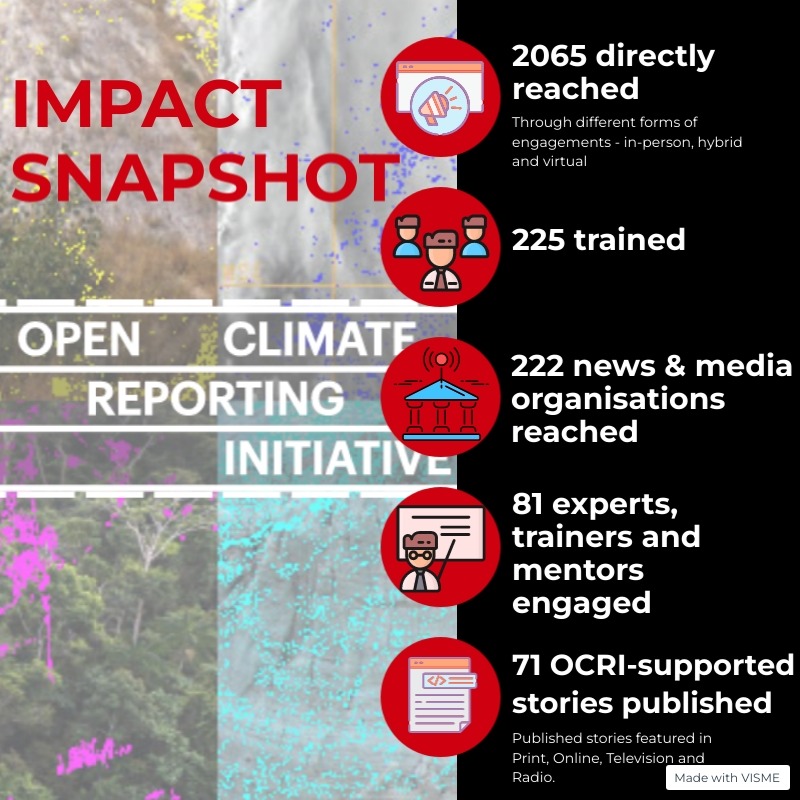OCRI Year two kicks off as impactful Year one ends
The last twelve months of implementing the Open Climate Reporting Initiative (OCRI) of the Centre for Investigative Journalism (CIJ) has been an impactful one and has provided the springboard to achieve more as we go into working in three new regions of the world namely Brazil & Lusophone Africa, South Asia and the Middle East & North Africa (MENA).
Following a successful pilot in Nepal where we trained 12 Nepali journalists and supported six investigative stories, we went into the three Year 1 regions: Latin America (excluding Brazil), Anglophone Africa and Francophone Africa. We have so far trained 225 and directly reached more than 2000 journalists, researchers and activists/environmentalists in 37 countries.

The reverberating impact of OCRI is quite breathtaking. Beyond mainstreaming climate change and environmental investigations at regional events in 2022 such as Festival Gabo in Colombia, the African Investigative Journalism Conference (AIJC) in South Africa and the Conferencia Latinoamericana de Periodismo de Investigación (COLPIN) in Brazil, we also witnessed cross-border investigations in West Africa facilitated by one of our Francophone Africa partners, CENOZO. We have also seen how the trained journalists are putting the skills gained to use by reporting climate change holistically as evidenced in the reports published either on specific subjects like mangrove disappearance or into the financial flows around climate change, such as the PowerTracker project analysing renewable energy funding across southern Africa.
While one of the supported stories drew the attention of Nepali authorities and led to policy change impacts, another which investigated the illegal charcoal trade in the Acholi subregion of Uganda led to the ban on the charcoal trade in the entire sub-region and the cancellation of all trading licenses. A loss and damage-related story titled The ravines are haunting us in Burundi, had the authorities confirm, shortly after the story aired, that a World Bank intervention to assist the area was on the way while a story about coastal erosion in Dionwar Island, Senegal, highlighting the loss and damage that the issue has had on local livelihoods – including a bridge that collapsed six months before the story was broadcast – led to the visitation of the region by the minister of roads three weeks after the story aired. An announcement of a programme focused on rebuilding bridges was made after the visit.

We recorded different commitments from state and non-actors during the course of the year but perhaps the biggest policy change contribution OCRI can point to is the establishment of a loss and damage facility at COP27 in Egypt. One of Anglophone Africa partners, CJID took this as its main agenda to COP seeing that 60% of the stories OCRI supported was about the impact of climate change including the urgent flooding intervention provided to report the devastating flood in Nigeria in a comprehensive way.
In a manner that seems to be replicating itself quickly, we have recorded opportunities to continue the work OCRI started with different partners. The CIJ itself is a beneficiary of this based on its current partnership with UNESCO to deliver investigative training on climate-related issues in Anglophone and Francophone Africa. The initiative is building on OCRI’s first year by continuing work in both regions and working again with CJID and Adisi-Cameroun to deliver the programme in Nigeria and Ghana for Anglophone Africa and Cameroon and Gabon for Francophone Africa.
These days of training helped me delve deeper into journalistic investigation processes about environmental topics. I was also able to create collaboration networks with more colleagues. – Feedback reported by participant (Peru).
It was very gratifying to attend the activities of the Festival Gabo 2022. I believe they refresh the outlook and generate reflection about journalism and its contexts. – Feedback reported by participant (Mexico).
After completing its OCRI intervention, Ajebudi-Yaga secured a partnership with UNICEF to address climate change issues and implement a project on climate change, alongside other topics related to children, such as early childhood development. Similarly, the Center for Data Journalism Nepal also received support from the Earth Journalism Network (EJN) for the Asia-Pacific Media Grants 2023. The project starting April 2023 and related to Geo Journalism and Data for Climate Reporting, aims to train 12-15 mid-career journalists in Nepal on climate/environmental issues following the success of the OCRI pilot.
By December 2022, Oxpeckers commenced phase 2 of #PowerTracker with support from African Climate Foundation and EJN while organisations like Fundación Connectas and AIIJ expect to continue the OCRI-inspired initiatives based on the curriculum developed within the year.
We look forward another impactful second year of implementing OCRI.

